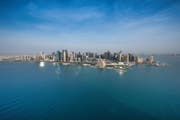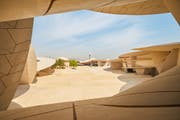Qatar is where cultural authenticity meets modernity; where the sand meets the sea; where people come together to experience unique offerings in culture, sports, business and family entertainment.
ABOUT QATAR
Qatar is welcoming 102 countries visa-free, check your visa status here.
ABOUT QATAR
Qatar is where cultural authenticity meets modernity; where the sand meets the sea; where people come together to experience unique offerings in culture, sports, business and family entertainment.


Qatar is a land where tradition meets modernity. It is a country whose people are rooted in their heritage while maintaining an eye on the future, and Qatar’s growing global role in business, politics, and education.
There is a deep respect for the nation’s history - archaeological sites and artefacts are painstakingly excavated and cared for – protected in-situ or housed in museums. Qatar is home to everything from neolithic rock carvings, modernist skyscrapers and gentle Dugongs in its glittering waters. This is where ancient dwellings are only a stone’s throw from world class museums, glistening malls, desert adventures, and international sports venues.
The country’s seafaring past today manifests in a continued reverence for the crystal waters that surround the peninsula. Fishing remains a passion, and enthusiasts can enjoy a plethora of water sports. From kayaking through the Al Thakira mangroves to the thrill of a desert safari while taking in the majesty of the Inland Sea, to relaxing by the beach, Qatar allows visitors to reconnect with nature.
Qatar holds thrills and novel experiences for all. It offers a window to the past – and a glimpse into the future, all under the umbrella of that famous Arabian hospitality.
 Falcon-Father-and-Son.jpg
Falcon-Father-and-Son.jpg
Archaeological evidence points to signs of human habitation on the Qatar Peninsula around 4000 years BC. For centuries, Qatar was largely populated by Bedouin tribes and a few fishing villages.
Qatar’s modern history begins in 1766 with the establishment of the town of Al-Zubārah, which became an important economic outpost. Before the discovery of oil and gas changed the fortunes of the gulf state, the economy was built around fishing, pearl diving and trading.
A British Protectorate from 1916, the modern state of Qatar was born on September 3, 1971, when it proclaimed its independence. Since then, the country has undergone rapid growth.
Qatar is a peninsula with a 563-km coastline jutting along the western coast of the Arabian Gulf. The country shares an 87 km land border with Saudi Arabia to the south. Bahrain, the United Arab Emirates, and Iran are nearby.
The country is characterised by its flat and arid desertscape. Qatar has a desert climate with year-round sunshine, hot summers and mild winters. Average monthly temperatures range from 17°C in January to 36°C in July, sometimes reaching highs of 40°C+ during the summer months. Average annual rainfall is 70 mm per year, and falls in brief showers between October and March, rarely hindering outdoor activities.

Desert safaris, archaeological sites, forts, Banana Island, Sheikh Faisal Bin Qassim Al Thani Museum, Al Dhakira Mangroves. Horse and camel racing, popular beaches, hotels, souqs.
Qatar controls about 13% of global oil reserves. The small population combined with the amount of petroleum production guarantees Qatar the title of richest country in the world.
Qatar is a fantastic and amazing holiday destination. There is an unbelieveable amount of leisure, adventure, dining and cultural offerings to discover.
For detailed information go to visitqatar.qa
Qatar offers world class universities liked to some of America's finest including Carnegie Mellon, Weill Cornell. Northwestern and Texas A&M.
Qatar has approximately 2.9 million people of which around 90% live in Doha, the capital. Foreign workers amount to around 88% of the population.
Yes, Qatar Airways is the country's national carrier.
Qatar was the first country in the world to make purple dye from shellfish. The dye was so rare it was used only for royal fabrics.
Qatar is ranked 31 out of 153 countries in the Global Peace Index, and is one of the safest countries in the world to live in for both families and individuals.
Definitely in the winter.November to March are ideal as the average daily temperature ranges from 20°C to 28°C, with the mornings and evenings getting pleasant at about 12°C to 14°C.
Qatar offers tradition and modernity that's difficult to find elsewhere. Qatar celebrates its heritage, but still offers newcomers and travelers modern amenities, new hotels and a mix of international cultures, cuisines and lifestyles.
Arabic is the official language and English is commonly used. Among the large expatriate population, Hindi, Persian and Urdu are often heard.
Many countries made rich through oil reserves are considered economically developed First World countries. So yes, Qatar is included in this category.
Yes, the Arabian Oryx, which was saved from extinction in the 1970s, is the national animal of Qatar. It's on the Qatar Airways logo and there's an Orry the Oryx sculpture along the Corniche. Orry was the mascot for the 2006 Asian Games in Doha.
| According to Skytrax in 2021, Hamad International is officially the best, beating Singapore's Changi Airport. Hamad is one of the most luxurious airports in the world and is full of art installations. |
To date, passengers can book Qatar Airways to and from US gateways including Boston, Chicago, Dallas/Fort Worth, Atlanta, Houston, Miami, New York (JFK), Philadelphia and Washington.
Qatar boasts one of the world's freest economies and relaxed foreign investment rules. Foreigners are allowed to to own local businesses outright.
The Qatar Philharmonic Orchestra consists of more than 100 musicians who perform western and Arabic music in local and international settings.
Things to do
Want to travel visa-free? Check if you qualify here.
Planning your trip to Qatar? Check how to get here.
Make the most of your visit with our handy travel guide.
From a dhow boat to our world-class metro, here’s how to easily explore Qatar.
